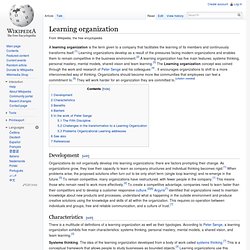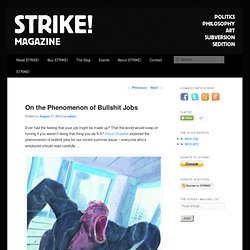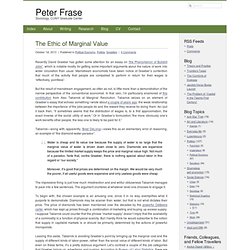

Le management - F. Mispelblom Beyer. Learning organization. A learning organization is the term given to a company that facilitates the learning of its members and continuously transforms itself.[1] Learning organizations develop as a result of the pressures facing modern organizations and enables them to remain competitive in the business environment.[2] A learning organization has five main features; systems thinking, personal mastery, mental models, shared vision and team learning.[3] The Learning organization concept was coined through the work and research of Peter Senge and his colleagues [4] .

It encourages organizations to shift to a more interconnected way of thinking. Organizations should become more like communities that employees can feel a commitment to.[5] They will work harder for an organization they are committed to. [citation needed] Development[edit] Organizations do not organically develop into learning organizations; there are factors prompting their change. Characteristics[edit] Systems thinking. Personal mastery. The Myth of the Cool Office - Rebecca Greenfield. Don't be fooled by the perks at all those Silicon Valley (and Alley) offices — it's all just part of a subtle plot to control employee behavior.

The founders of Fab.com, which just got itself a $1 billion valuation, admitted as much to Bloomberg's Sarah Frier. The shopping site wields its beer on tap, free lunch, and ice-cream machine as a means to force Fab employees to send emails in a "certain font," use high-quality paper, and always "be Fab" — whatever terrible thing that means. Those types of office perks abound at startups, of course, not only as a way to attract the best talent, but also to get that "talent" working on message, official office font included. Each and every kegerator serves as a reminder of what you owe the company. And that's just the food and drink. Unlimited Vacation Days Nobody Takes It sounds like the best perk ever: You could, officially, and under official policy, get paid for a three-month summer vacation. Translation: non-stop vacation is a ruse. Companies Need 4 Leadership Types, Says VMware’s Chief. Q.

What are some important leadership lessons for you? A. I’ve learned that when you go from being an individual contributor to being a leader of a small group of 5 to 10 people, to leading 100 people, to leading 1,000 people, to leading 10,000 people, the nature of your job changes at each of those points. Q. Talk more about that. A. You have to realize that your contribution becomes more symbolic, in the sense that you’re trying to set a general direction. And, as the groups get bigger, the period over which you measure your own performance gets longer, and the way you get your feedback changes. Almost at any level, the really successful people in organizations are the ones who try to structure their lives to learn and get feedback and be self-aware. Q. A. Q. A. Q. A. Peter Principle. An illustration visualizing the Peter principle The Peter Principle is a concept in management theory in which the selection of a candidate for a position is based on the candidate's performance in his or her current role rather than on abilities relevant to the intended role.

Thus, employees only stop being promoted once they can no longer perform effectively, and "managers rise to the level of their incompetence. " The principle is named after Laurence J. Peter who co-authored with Raymond Hull the humorous 1969 book The Peter Principle: Why Things Always Go Wrong. Overview[edit] The Peter Principle is a special case of a ubiquitous observation: Anything that works will be used in progressively more challenging applications until it fails. On the Phenomenon of Bullshit Jobs. Ever had the feeling that your job might be made up?

That the world would keep on turning if you weren’t doing that thing you do 9-5? David Graeber explored the phenomenon of bullshit jobs for our recent summer issue – everyone who’s employed should read carefully… On the Phenomenon of Bullshit Jobs by David Graeber. In the year 1930, John Maynard Keynes predicted that, by century’s end, technology would have advanced sufficiently that countries like Great Britain or the United States would have achieved a 15-hour work week. There’s every reason to believe he was right. Why did Keynes’ promised utopia – still being eagerly awaited in the ‘60s – never materialise? So what are these new jobs, precisely?
The Ethic of Marginal Value. Recently David Graeber has gotten some attention for an essay on “the Phenomenon of Bullshit Jobs”, which is notable mostly for getting some important arguments about the nature of work into wider circulation than usual.

Mainstream economists have taken notice of Graeber’s contention that much of the activity that people are compelled to perform in return for their wages is “effectively, pointless”. But the result of mainstream engagement, as often as not, is little more than a demonstration of the narrow perspective of the conventional economist. In that vein, I’m particularly enamored of this contribution from Alex Tabarrok at Marginal Revolution. Working hours: Get a life.